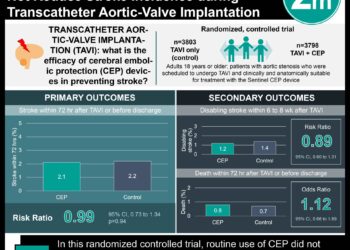Polypill strategy reduces the risk of cardiovascular events after a myocardial infarction
1. A polypill consisting of aspirin, ramipril, and atorvastatin reduced the risk of major adverse cardiovascular events after a myocardial infarction (MI).
2. Medication adherence was higher in patients receiving the polypill compared to usual care.
Evidence Rating Level: 1 (Excellent)
Study Rundown: The incidence of recurrent ischemic events is increasing globally despite effective pharmacotherapies which have been developed for secondary prevention. Notably, patient adherence to secondary prevention medications is only estimated to be approximately 50%. It follows that a lack of adherence to these pharmaceuticals is associated with poor outcomes. A polypill strategy has been proposed to improve medication adherence through treatment simplification by reducing the number of medications taken. However, there is a gap in knowledge as to understanding the efficacy of a polypill-based strategy compared to usual care concerning major cardiovascular outcomes in older patients with recent myocardial infarction (MI). Overall, this study found that the polypill treatment strategy led to a lower frequency of cardiovascular events than a usual care strategy. This study was limited as no adjustment was made for multiple comparisons of secondary outcomes, and loss to follow-up may potentially bias comparisons between groups. Finally, the coronavirus disease 2019 pandemic might have precluded some patients from completing trial visits. Nevertheless, these study’s findings are significant, as they demonstrate that this polypill strategy can significantly reduce the risk of adverse cardiovascular events after a MI and can improve accessibility and adherence to treatment.
Click to read the study in NEJM
Relevant Reading: Cardiac Rehabilitation and Secondary Prevention of Coronary Heart Disease
In-Depth [randomized controlled trial]: The present phase three randomized control trial was conducted at 113 centers across Europe. In this trial, patients with a MI within the previous six months were assigned to a polypill strategy or usual care. The polypill regimen consisted of aspirin, ramipril, and atorvastatin. Patients with a history of type one MI within the previous 6 months and who were older than 75 or 65 with a risk factor such as diabetes or kidney disease were eligible for the study. Patients who were receiving oral anticoagulation were excluded from the study. The primary outcome measures were cardiovascular death, nonfatal type one MI, nonfatal ischemic stroke, and urgent revascularization. Outcomes in the primary analysis were assessed via noninferiority according to the intention to treat principle with Kaplan-Meier analyses and log-rank tests. Based on the primary analysis, a primary outcome event occurred in 9.5% of patients in the polypill group and in 12.7% of patients in the usual care control group (Hazard Ratio [HR] 0.76; 95% Confidence Interval [CI] 0.6 to 0.96). A key secondary outcome event occurred in 8.2% of the polypill group and in 11.7% of the usual care group (HR 0.7; 95% CI 0.54 to 0.9). Medication adherence at six months as reported by patients was higher in the polypill group at 70.6% compared to 62.7% in the usual care group (Risk Ratio 1.13; 95% CI 1.06 to 1.2). In summary, this study demonstrates that a polypill treatment strategy significantly reduces the risk of major cardiovascular adverse events after a MI in older patients and significantly improves adherence to these key medications.
Image: PD
©2022 2 Minute Medicine, Inc. All rights reserved. No works may be reproduced without expressed written consent from 2 Minute Medicine, Inc. Inquire about licensing here. No article should be construed as medical advice and is not intended as such by the authors or by 2 Minute Medicine, Inc.







![The ABCD2 score: Risk of stroke after Transient Ischemic Attack (TIA) [Classics Series]](https://www.2minutemedicine.com/wp-content/uploads/2013/05/web-cover-classics-with-logo-medicine-BW-small-jpg-75x75.jpg)